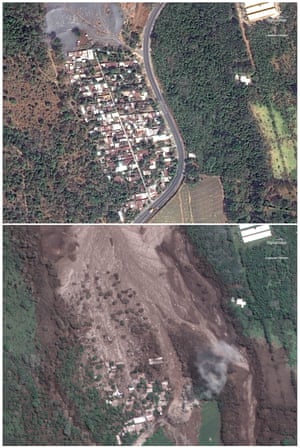Rescuers have suspended search and recovery efforts at villages devastated by the eruption of Guatemala’s Volcano of Fire, leaving people with missing loved ones distraught and prompting some to take up the risky work themselves with rudimentary tools.
Conred, the national disaster agency, said weather conditions and still-hot volcanic material were making it dangerous for rescuers.
It also noted that 72 hours had passed since Sunday’s eruption.
That is the window beyond which officials earlier said it would be extremely unlikely to find any survivors amid the ash, mud and other debris that buried homes up to their rooftops.
“It rained very hard yesterday … The soil is unstable,” said Pablo Castillo, a national police spokesman.
Authorities have admitted that a communication breakdown between Conred and volcanologists in Guatemala delayed evacuations from the surrounding area.
Guatemalan prosecutors said on Thursday they would launch an investigation into whether emergency protocols were followed properly.
Since the eruption, downpours and more volcanic activity had been hindering searches, but when teams have been able to work in the hardest-hit areas, the death toll has continued to rise. It was officially still at 99 with nearly 200 more believed to be missing.
Before and after satellite photos released on Thursday showed the destruction wrought by deadly flows of superheated materials and debris from the volcano.

The village of San Miguel Los Lotes – once a collection of modest homes with a road running alongside – was almost completely buried.
Oscar Chávez trekked over a mountain with his father and younger brother to search for his brother Edgar, sister-in-law Sandra and four-year-old nephew Josué in the hamlet. They have not been heard from since the eruption.
“We looked for them in shelters, hospitals, everywhere, but we did not find them,” said Chávez, 34, wiping a tear from his eye as the others used sticks and bits of broken boards to dig at the collapsed, ash-filled home. “So, better for us to come here.”
A group of police officers saw what the family was doing and came to lend shovels and help with the digging.
A dozen other families also arrived to search the homes. Before Thursday they had been unable to access the area while rescuers were working.
Chávez’s younger brother was angry that there were no longer any disaster workers at the scene while a little way downhill heavy machinery was being used to clear a road blocked by ash. And he directed his ire at the Guatemalan president, Jimmy Morales.
“They are cleaning the highway because the president has commitments to businesspeople … But here, since the people have nothing to offer him, he leaves this part as a burial ground,” said Francisco Chávez, a 29-year-old accounting student.
At a shelter set up in a school in the nearby city of Escuintla, workers fastened colorful ID bracelets on the wrists of people who are among several thousand displaced by the eruption.
Nohemi Ascon, 41, is the aunt of six children between the ages of one and eight who died in Los Lotes.
Ascon said other family members were still unaccounted for.
“My father, my mother, my sisters are there,” she said, upset over rescuers’ decision to suspend their search. “It is their job. It is not right that they leave them there. They should get them out so we can take them to the cemetery.”